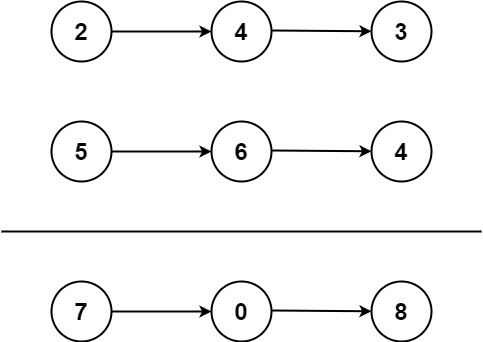2. Add Two Numbers
Problem
Tags: Linked List, Math, Recursion
You are given two non-empty linked lists representing two non-negative integers. The digits are stored in reverse order, and each of their nodes contains a single digit. Add the two numbers and return the sum as a linked list.
You may assume the two numbers do not contain any leading zero, except the number 0 itself.
Example 1:

Input: l1 = [2,4,3], l2 = [5,6,4]
Output: [7,0,8]
Explanation: 342 + 465 = 807.
Example 2:
Input: l1 = [0], l2 = [0]
Output: [0]
Example 3:
Input: l1 = [9,9,9,9,9,9,9], l2 = [9,9,9,9]
Output: [8,9,9,9,0,0,0,1]
Constraints:
- The number of nodes in each linked list is in the range
[1, 100]. 0 <= Node.val <= 9- It is guaranteed that the list represents a number that does not have leading zeros.
Solution
This is a linked problem.
We have a O(n) solution.
Code
GO
// 2. Add Two Numbers (12/14/53371)
// Runtime: 12 ms (55.88%) Memory: 4.75 MB (7.74%)
/**
* Definition for singly-linked list.
* type ListNode struct {
* Val int
* Next *ListNode
* }
*/
func addTwoNumbers(l1 *ListNode, l2 *ListNode) *ListNode {
zero_node := &ListNode{ Val: 0 }
list := &ListNode{ Val: 0 }
pos := list
first, sum, carry := true, l1.Val + l2.Val, 0
for sum != 0 || l1.Next != nil || l2.Next != nil || first {
first = false
carry = sum / 10
sum = sum % 10
pos.Next = &ListNode{ Val: sum }
pos = pos.Next
if l1.Next != nil {
l1 = l1.Next
} else {
l1 = zero_node
}
if l2.Next != nil {
l2 = l2.Next
} else {
l2 = zero_node
}
sum = l1.Val + l2.Val + carry
}
return list.Next
}
JS
// 2. Add Two Numbers (11/9/53371)
// Runtime: 124 ms (62.40%) Memory: 44.15 MB (94.90%)
/**
* Definition for singly-linked list.
* function ListNode(val, next) {
* this.val = (val===undefined ? 0 : val)
* this.next = (next===undefined ? null : next)
* }
*/
/**
* @param {ListNode} l1
* @param {ListNode} l2
* @return {ListNode}
*/
var addTwoNumbers = function (l1, l2) {
const zero_node = new ListNode(0, null);
let list = new ListNode(undefined, null);
let pos = list;
let first = true,
sum = l1.val + l2.val,
carry = 0;
while (sum || l1.next || l2.next || first) {
first = false;
carry = parseInt(sum / 10);
sum = sum % 10;
pos.next = new ListNode(sum, null);
pos = pos.next;
l1 = l1.next || zero_node;
l2 = l2.next || zero_node;
sum = l1.val + l2.val + carry;
}
return list.next;
};
TS
// 2. Add Two Numbers (8/9/54157)
// Runtime: 112 ms (81.89%) Memory: 49.05 MB (12.29%)
/**
* Definition for singly-linked list.
* class ListNode {
* val: number
* next: ListNode | null
* constructor(val?: number, next?: ListNode | null) {
* this.val = (val===undefined ? 0 : val)
* this.next = (next===undefined ? null : next)
* }
* }
*/
function addTwoNumbers(l1: ListNode | null, l2: ListNode | null): ListNode | null {
const ans = new ListNode();
let curr = ans,
carry = 0;
while (l1 || l2 || carry) {
const sum = carry + (l1?.val || 0) + (l2?.val || 0);
carry = Math.floor(sum / 10);
curr.next = new ListNode(sum % 10);
curr = curr.next;
l1 = l1?.next;
l2 = l2?.next;
}
return ans.next;
};